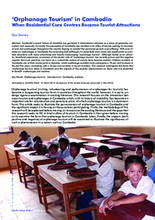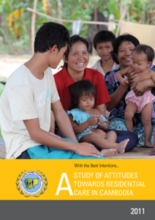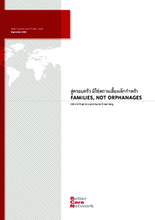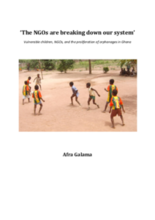Displaying 121 - 130 of 134
This report was commissioned by the Swedish network Schyst Resande and conducted by the Fair Trade Center, with the overall objective of raising awareness of children’s rights in relation to tourism and travel destinations which many Swedish tourists visit.
The objective of this study was to provide basic information on the current situation of children under institutional care in the entire country of Sri Lanka, in order to identify the issues affecting those institutionalized children and to recommend plausible solutions.
As part of a wider qualitative study of the volunteering experience, this paper seeks to critique the problematic relationship between a touristic experience and the needs of Cambodia’s poor children.
This research investigates the forms that ‘orphanage tourism’ takes in Cambodia and the impacts of this popular phenomenon on those who are purported to benefit: orphanages and orphans.
Study to understand prevailing attitudes towards residential care in Cambodia and to generate evidence for policy development and advocacy
This article reviews the current discourse on what is being called a crisis of care for children, as well as literature on out-of-home/family care and its adverse impacts on child development. The article also describes an emerging “AIDS orphan tourism” and highlights its negative impacts.
With particular attention to lower income countries, Families, Not Orphanages examines the mismatch between children’s needs and the realities and long-term effects of residential institutions.
The focus of this thesis is the position of orphans, vulnerable children and orphanages in Ghana in relation to the ‘help’ they receive from western volunteers and NGOs.
This analysis compares historic and current trends in Ukrainian orphanages with changes that led to the general demise of the American institutionalized child welfare system.
This page of its website outlines what types of programs and activities UK Aid Direct will not be funding, including orphanages.








